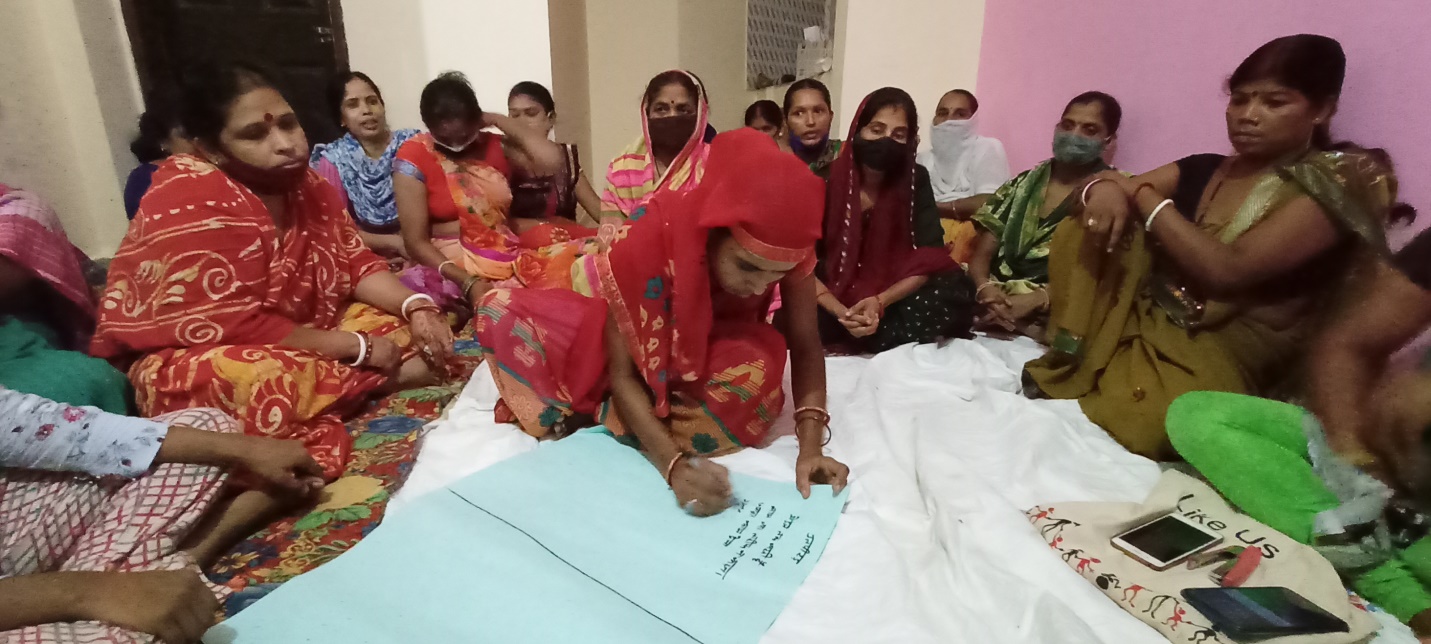| Date 06-Aug-2021 to 06-Aug-2021 |
Location Gurugram, India |
Format Local |
The fourth session with women domestic workers under the Sapne Mere Bhavishya Mera program was held on 6th August 2021. The session was to build understanding on sexual harassment at workplace. A total of 31 women domestic workers attended the session.
After the deep conversation on violence the previous week, women domestic workers were curious to know how they can fight back if any incidence of violence happens.
The community leaders, Sarita ji and Akhleema ji, coordinated with the women to attend the session. The session was held at the newly set-up Resource and Information Centre located inside Harijan Basti. This Centre has been set up as a space for women to spend time away from their homes in a safe environment, share and discuss their lives, and ask for information or help.
A young domestic worker Nirmala asked, “Aap logo ne to hume hinsa ke bare main bata diya ab ye bhi bataiye ki iska samadhan kya hai?” (You briefed us about the violence, now please tell what are the possible solutions).
After this, the discussion with the women expanded. To answer the specific question, the women were made aware of how to file a complaint in the police station if they experience violence in their houses or any public place.
The conversation soon veered towards understanding what is sexual harassment (as a form of violence) and what is a workplace.
The women were asked to reflect on the art-based exercise conducted in the previous session, in which they had pasted the “effects of violence” on their lives as leaves on a problem tree. This was their problem-tree, with the roots of the tree deep in the structures of patriarchy and socialization.
The group’s reflections were written on a chart paper by a volunteer from the group, as the discussion proceeded with the facilitator explaining the difference between harassment and sexual harassment by focusing on words like ‘ganda’ (inappropriate), and ‘jo acha na lage’ (something that makes you uncomfortable).

The women soon began sharing their own lived experiences of the sexual harassment they face on a daily basis. A young domestic worker shared her recent experience where a security guard of the building where she worked commented as she walked by, “Sari pehen ke to kamaal lag rahi ho” (You look amazing in that sari).” Her colleagues shared how new migrants domestic workers are harassed by middle men to get a job as a domestic workers.
Some women shared the severity of the impact on the lives of women workers, which sometimes “forces” them to go back to their home villages. A few have also been driven to suicide. Migrant women domestic workers who come from non-Hindi speaking states (like West Bengal) rarely know how to speak Hindi, so they feel they are more vulnerable to being sexually harassed at their workplaces because people think that they will be unable to complain as they cannot understand the local language and speak it confidently to lodge a complaint.
Sexual harassment at workplace was discussed in detail, including the concept of “world of work”. A brief history of the Prevention of Sexual Harassment at Workplace Act, 2013 was given. The Bhawari Devi case from Rajasthan and its impact on the passage of the Act was also discussed. After identifying what is sexual harassment, the trainees were informed about the steps that they could take if they experience sexual harassment. The Local Committee in the District Magistrate’s office is responsible for delivering justice to an informal woman worker within 90 days. They were also told how this time-bound justice delivery was different from going to the police and filing an FIR.